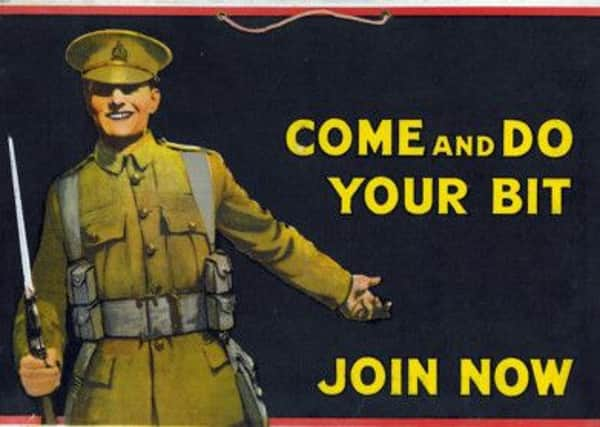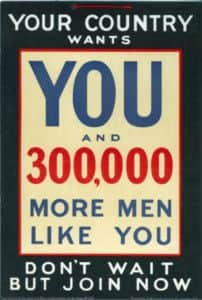Rare World War One poster collection to go online


WITH their beaming smiles and jaunty step, you might almost be mistaken for thinking that these cartoon characters are appealing for young boys to join them on a Famous Five type adventure.
Even the rosy-cheeked chaps request of “Line Up Boys - Enlist Today” manages to mask the true horror of the advert - looking for young recruits to boost the First World War effort - which became one of the deadliest conflicts in human history.
Advertisement
Hide AdAdvertisement
Hide AdThe collection of about 300 posters, from Britain and other allied countries, were compiled by the McLean Museum in Greenock during the conflict and immediately afterwards.


A lottery grant of £51,300 will now allow the Inverclyde Council-run museum to scan the full collection and make it available over the internet.
The McLean Museum’s assistant curator Vincent Gillen explained that the poster collection only happened because of a visionary museum staff member.
He said: “From 1914 the secretary of the museum Thomas Thomson had the foresight to write to the High Commissions and Embassies of the countries fighting against the Germans and their allies asking for examples of posters.
“He was sent recruitment adverts and propaganda posters from Britain, France and Ireland, as well as material from America and Canada.
He added: “Some are very rare and all of them are in near perfect condition as they were sent directly to the museum and have been safely stored away ever since.”
Mr Gillen said the collection was “unique” and would surely be “very popular” when available online.
Inverclyde Council’s communities vice convener, Councillor James McColgan, said: “Communities in Inverclyde, like many parts of Scotland, were torn apart by the events of the First World War.
Advertisement
Hide AdAdvertisement
Hide Ad“The country lost a generation in a little over four years and next year’s centenary commemorations give us the chance to remember the sacrifices made and how they shaped our country today.
“The artwork and message of these posters reflect a different time and by being able to make them available online we can share this fascinating glimpse into that conflict with generations to come.”
A collection of local newspapers from the period will also be digitised as part of the project.
Colin McLean, head of the Heritage Lottery Fund Scotland, said: “Saving our historic archives is important as they provide such a valuable resource for anyone wanting to explore their past.
“This First World War collection is bursting with images that give us clues about what life was like and how that has shaped us into what we are today.”
The digital collection will be a key part of the Scotland-wide commemorations next year of the centenary of World War I.
The Queen is to lead the nation in the centenary commemorations in a service at Glasgow Cathedral on August 4 2014.
The city has been chosen as a focal point for activities to mark the start of the conflict, as it is hosting the Commonwealth Games which end the day before.
Advertisement
Hide AdAdvertisement
Hide AdAcross the country, flags on public buildings will fly at half mast on the anniversary of the outbreak, while, in Belgium, another service will be held at St Symphorien Military Cemetery near Mons, where similar numbers of British and German war dead are buried, including the first and last Commonwealth soldiers killed in the conflict.
The day will end with a vigil at Westminster Abbey where a single candle will be extinguished at 11pm, a century on from the moment when, in the words of Sir Edward Grey, Britain’s foreign secretary at the time, “the lamps are going out all over Europe”.
Nearly 10 million soldiers were killed before the guns finally fell silent on Armistice Day, 11 November 1918.